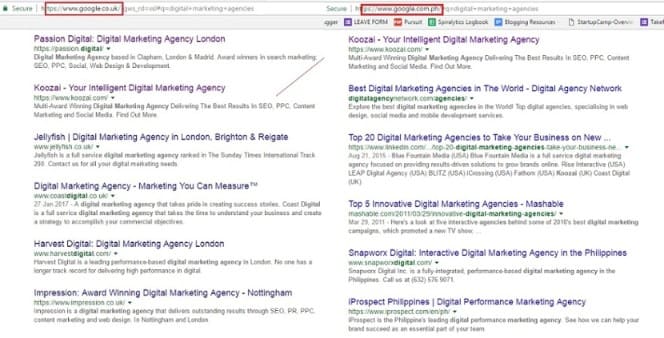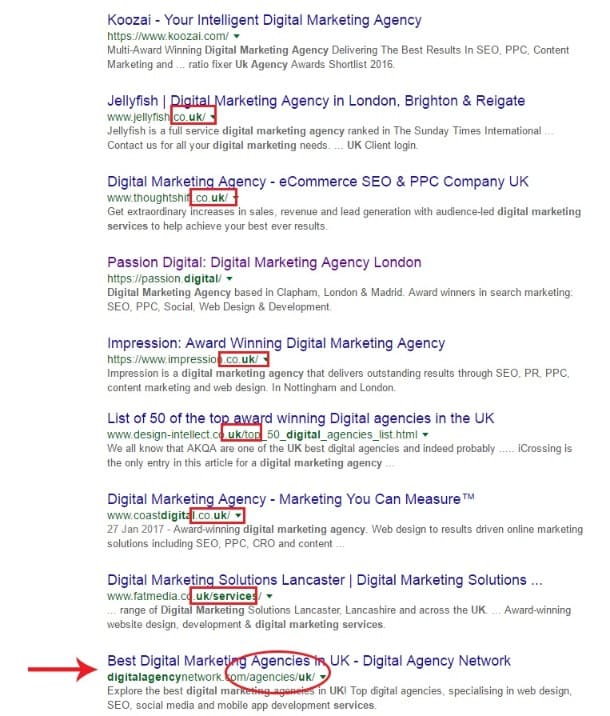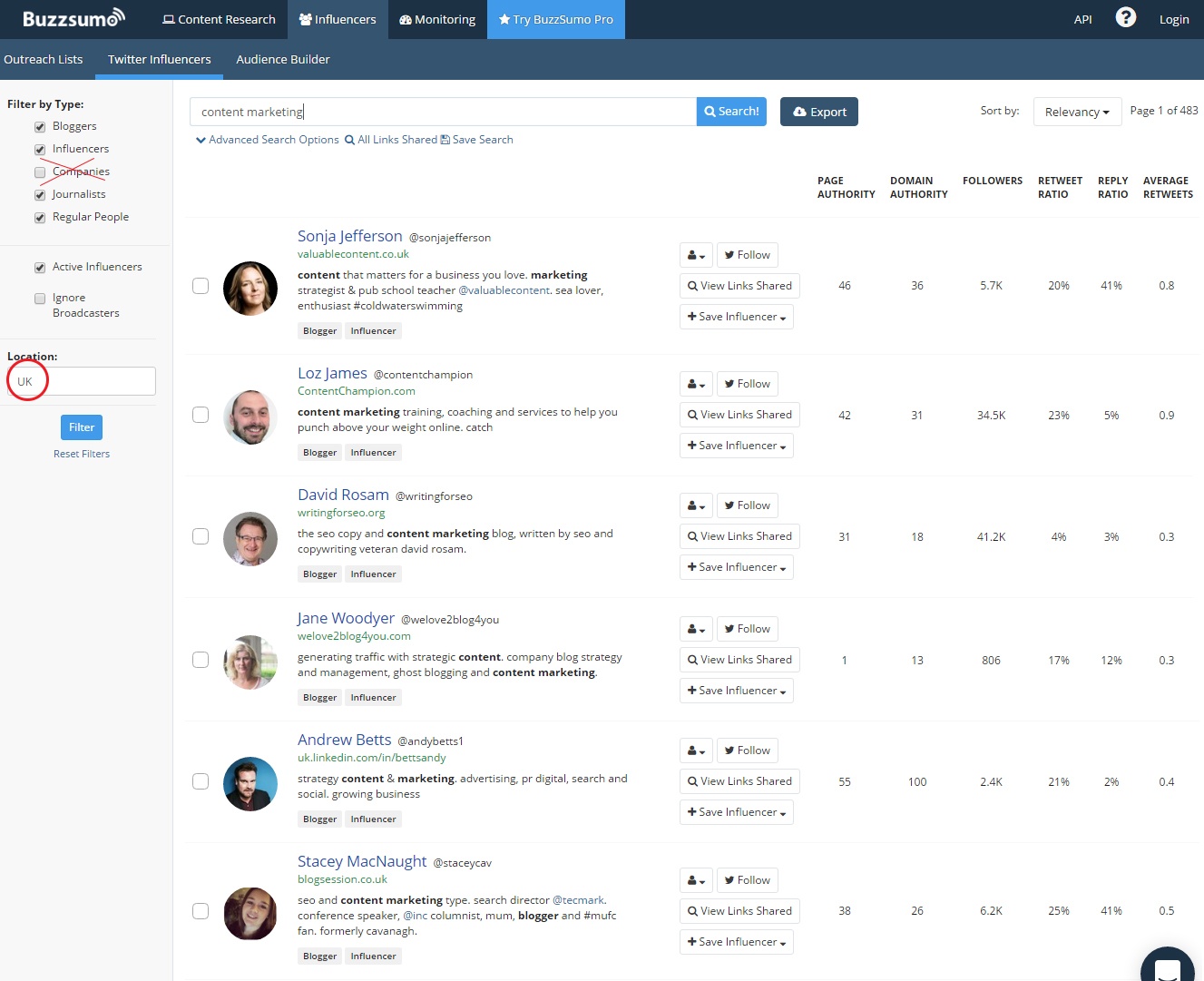As the world gets smaller and more connected than ever, it’s not unusual that a US-based enterprise would collaborate with a digital marketing agency in London, or a Manila-based SEO company would have a client in the United Kingdom, or a Manchester-based investor would have a business in, say, Hong Kong.
It’s also quite possible that a company based in Asia Pacific would expand globally, thus the need to go beyond the usual borders in order to reach new markets.
We see this happen all the time, and as a digital marketing agency that’s currently establishing presence in the UK, one of the many questions we get asked is this:
Is there’s any difference between ranking in Google.com and ranking in Google.co.uk?
The answer is, yes, there is a significant difference.
To illustrate, here’s a quick look at the keyword “digital marketing agencies”, with Google.co.uk and Google.com.ph search results side by side.

Take note that except for this one website (Koozai), none of the results in the list remained the same. (Later we’ll discuss more about the possible reasons why Koozai nailed both SERPs.)
The fact is, local SEO matters a lot in this digital age because (1) search engines factor in location data and location-specific content when displaying results and (2) it can be assumed that people have a tendency to include location keywords when searching for businesses online.
Today we’re sharing with you some practical tips on how to rank in Google UK.
1. Add “UK” in your URL
Needless to say, a .co.uk domain name indicates to search engines that your location is in the UK. Notice that practically all websites ranking on the first page for “digital marketing agencies” in Google.co.uk has .co.uk domain names.

However, in the absence of a .co.uk domain name (which is most likely the case if you’re a multinational company), you can set up a /UK/ slug on your URL through the following ways:
A UK-specific page
Here’s a sample url: www.domain.com/keyword/uk. Take note of the last item in the results above and see how they formatted the URL: digitalagencynetwork.com/agencies/uk/
A UK-specific blog category
If you’re using WordPress, Squarespace, even Hubspot, you can assign specific URL slugs to your blog categories. Use categories and tags to incorporate “UK”.
A few UK-specific blog posts
It’s always best if you can regularly publish blog content that’s specific to your target location. Whenever you do this, tag the posts properly, link them to each other internally, and make sure to link all of them to your main UK page.
Link building will always be relevant to SEO, and in this case, you get a lot of value from having .co.uk websites linking back to your own.
Let’s go back to the SERPs of the keyword “digital marketing agencies”.

Looking at Koozai’s website, which happens to be comfortably sitting at the top of both .co.uk and .com.ph SERPs, we have interesting findings to discuss.
The words “UK” or “United Kingdom” are not indicated in Koozai’s URL or anywhere in the page except on the footer, which bears their UK address.
So, if the keyword “UK” is not in the URL and not prominent on the page as well, what do you think makes the page rank so well in Google.co.uk?
Certainly this is a combination of many factors, but I’m willing to bet that a lot of it has to do with an old but powerful link the website gained from a DA 100, UK-based news site, BBC.co.uk.
A quick check in Open Site Explorer showed us this all-important BBC link:

Score!
This tells us one thing–that gaining links from various .co.uk websites will add a lot of value to your website’s SEO, but getting a link from high authority .co.uk websites will speed up the process.
Not to mention, it will potentially solidify your rankings for years to come.
It’s always a challenge to acquire high quality links, but that shouldn’t keep you from thinking of creative ways to capture these high authority websites’ attention. You’ll never know which one will generously link back to you.
Read: 3 Actionable Outreach Strategies to Drive High Quality Links
3. Reach out to UK-based influencers
At this point you would have noticed that the mechanics of the game is universal—you’re doing SEO except with more specific regional considerations. You want to create location-specific content and links, as well as build connections with influencers and peers within that region.
We recently rounded up some of the top Digital Marketing influencers in the UK based on their social media following and can I just add that the Brits are very social and friendly people?
It’s not difficult to connect with them, really. And it’s not difficult to find them too.
Finding UK-based influencers is as easy as adding “UK” on the location field of your Buzzsumo influencer research as seen below:

4. Claim your UK listing
In a recent post on SEO trends, we discussed thoroughly how to optimize websites in the age of mobile and local search. This includes optimizing pages to load faster and more efficiently on mobile devices, since many search users are on-the-go when they’re looking for location-based businesses.
It’s important to claim your listing on Google Business, place your UK locations (or multiple locations) on the map, and make sure that your addresses are similar across the board–from your public listings to your contact page to the fine print on your footer. This is one way Google can confirm your presence in those specific regions.
Read: 12 Key SEO Trends for 2017: How to Rank Better in this Age of Semantic, Local and Mobile Search
5. Invest in Content Marketing
Earlier I mentioned creating UK-specific blog posts for the purpose of integrating keywords to your pages. But more than these UK-related keywords, you should invest in creating content that your target market will find relevant and useful.
In a recent UK Benchmark Report by CMI, it has been found that 87% of UK Marketers are using Content Marketing to drive profitable action to their businesses, and 53% are increasing their Content Marketing budget in 2017.
That said, a documented content strategy that has clearly defined SEO goals is an important investment for your business this year. It’s the key to increasing link building opportunities and social media exposure which, overall, results to an improved search engine visibility.






